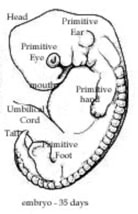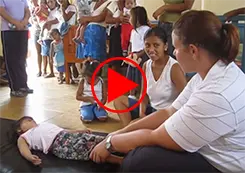Fear Paralysis Reflex (FPR)

The FPR is a withdrawal reflexes that emerges in the embryonic stage. During this .stage the embryo reacts to stress and stimulation by withdrawing and freezing. As the foetus’ tactile awareness develops, withdrawal upon contact gradually lessens. It is thought that this reflex is the first step in learning to cope with stress. Ideally, the FPR merges into the Moro reflex and has become inactive before birth. If the FPR is not fully integrated at birth it may contribute to life-long challenges related to fear. People with the FPR active may often be very anxious and tend to veer towards negativity which can prevent them from easily moving forward to living a meaningful, interactive life. An active FPR often goes hand-in-hand with an un-integrated Moro reflex.
Some possible long term effects of an unintegrated FPR are:
- Shallow, difficult breathing
- Underlying anxiety or negativity
- Insecure, low self-esteem
- Depression/isolation/withdrawal
- Constant feelings of overwhelm
- Extreme shyness, fear in groups
- Excessive fear of embarrassment
- Fear of separation from a loved one, clinging
- Sleep & eating disorders
- Feeling stuck
- Elective mutism
- Withdrawal from touch
- Extreme fear of failure, perfectionism
- Phobias
- Aggressive or controlling behaviour, craves attention
- Low tolerance to stress



